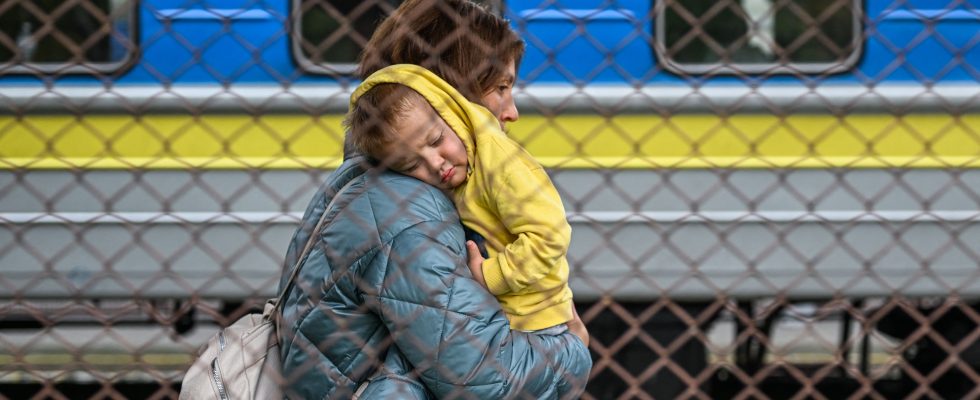“Every morning, my first instinct is to watch the news in Ukraine.” Anna Stavychenko, deputy director of the Kiev Symphony Orchestra and a refugee in France since April 2022, is constantly worried about her parents, who returned to live in Kiev after a stay in Poland at the start of the war. But she chose to stay in France, where she manages the reception of Ukrainian musicians at the Philharmonie de Paris.
Like her, 8 million Ukrainians have found refuge abroad: 90% are women and children. Immigration for the majority young, qualified, and well integrated in the host countries. In Lyon, Diana Dymytrova, who arrived in France in April 2022, and who now speaks our language well, has just received a job offer as a veterinary assistant. At the same time, Katerina Sazonova left to live in Austin, in the United States. In full creation of her live performance company, she got used to her new life, just like her children of 10 and 12 years old. “They already speak better English than me!” she jokes.
But if the refugees stay to work and live abroad, who will return to Ukraine? However, the country, whose population of 44 million inhabitants was already declining and aging before the war and which is now suffering heavy losses, is in a catastrophic demographic situation. “We are in a phase of advanced depopulation, and there will not be a baby boom like after the Second World War,” predicts Ella Libanova, director of the Ptoukha Institute for Demography and Social Studies at the National Academy. science of Ukraine.
Bringing refugees back is therefore a vital necessity for Ukraine. But easier said than done. “Each month spent abroad by Ukrainian refugees reduces the likelihood of their return to Ukraine,” points out the economist. “Even if they are only 50% to return, it will be a failure”, adds the geographer Gérard-François Dumont, for whom Ukraine, whether it loses or wins the war, will come out of it bloodless and will urgently need workforce.
Consider returning
The Ukrainian exiles, who have the love of their country pegged to the body, “are all considering a return”, indicates Joséphine Brive, student researcher at Sciences Po Bordeaux, who works on their careers in Villeurbanne. But the moment when they will pack their bags remains unclear. “They often postpone their departure, wait, for example, for the end of their children’s school year, then the end of the year… and, finally, become discouraged from returning,” explains the researcher.
Some make occasional trips to Ukraine, to settle administrative matters, and take the opportunity to take the temperature of the country. A sign that the horizon of a return is still in people’s minds, most Ukrainian schoolchildren or students continue to be educated in Ukraine, online from their host country. “This entails a huge volume of work, but allows you to continue to speak the language, and to prepare for a certain ‘return to normal'”, testifies Anna Stavychenko.
A country that we no longer recognize
She knows, however, that “normalcy” in Ukraine is only a distant memory. “My life before is dead, I will never find it again,” admits the young woman. Many Ukrainians fear, among other things, returning to a country defaced by bombs and still under threat from Russia. These refugees filed 28,000 asylum applications last year in Europe, which means giving up Ukrainian passports. In 86% of cases, the request was accepted.
“They have stability here, outside Ukraine,” explains Joséphine Brive. On their return, everyone knows that jobs, apartments and functional public services will be scarce. “It is simply not in their interest to return to Ukraine, neither now nor a few months after the war”, sums up Pauline Weill, independent economist. The return will also be conditioned by the reconstruction plan and the investment policy.
Contribute to reconstruction from abroad
Far from their country, the refugees nevertheless seek to work for it. “They are even more useful abroad, to continue to mobilize public opinion against Russia,” says Pauline Weill. “The Russians want to see us miserable, to erase everything from our culture. We have to show them, wherever we are, that we will continue to exist,” says Anna Stavychenko. Nataliya Pryhornytska, vice-president of the Ukrainian alliance in Berlin, also highlights the role of refugees for the future of Ukraine: “We are working together on the theme of reconstruction, with working groups and conferences on this topic.”
In any case, the decision to return can only come from the refugees. And the Ukrainian government seems to have understood this. “Giving them advantages on their return would be clumsy, because we would take the risk of hurting those who had the courage to stay, argues Ella Libanova. We must have a balanced policy.”
Often internalized, the feeling of guilt never really goes away. “I feel so privileged, I almost have no right to complain,” slips Anna Stavychenko. To compensate for their absence, these refugees send money to their families back home, make donations, and organize collections for civilians or the army. Because they know it: their future in Ukraine implies first of all winning the war.
